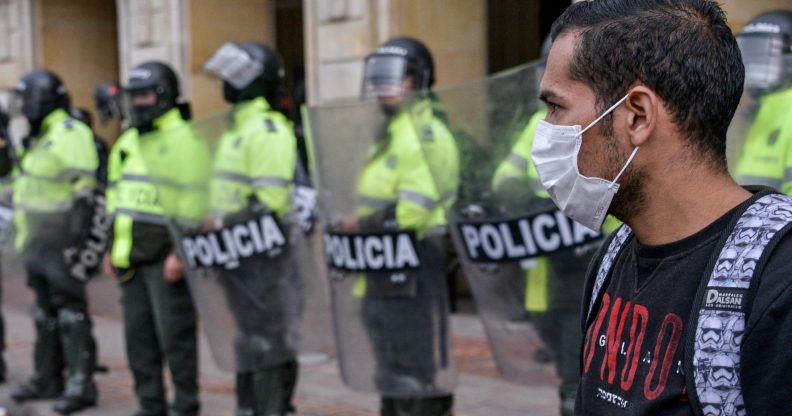Gender-based lockdown rules spark rise in transphobic attacks in Colombia’s capital

Police assemble in Bogota, the capital of Colombia on March 24, 2020 (Guillermo Legaria Schweizer/Getty)
Gender-based lockdown rules implemented in Bogotá, Colombia are fuelling a rise in attacks against the transgender community, LGBT+ activists warn.
In an effort to limit the number of people on the streets the mayor of Bogotá, Claudia López, introduced the policy known as pico y género (peak and gender).
It permits women to go outdoors for essential tasks on even-numbered days, while men are allowed out on odd-numbered days.
López assured transgender people that they would be allowed to go out on days corresponding to their identity, and city authorities said no one would be asked to show proof of gender.
But human rights groups have reported that the policy has triggered a rise in attacks against the transgender community from police and the public.
One trans woman was stabbed on the street.
Red Comunitaria Trans told Reuters it had received 18 discrimination complaints since the measure began, one being from a transgender woman who was stabbed by a man who said she was out on the wrong day.
Juli Salamanca, communications director for Red Comunitaria Trans, spoke of the physical and emotional toll of discrimination and prejudice experienced by trans people during the pandemic.
“They’re trying to protect themselves from the violence of the police, the violence of the supermarkets, the violence of society in general,” she said, adding that some trans people were unwilling to report the discrimination because of previous police abuse.
“In a city like Bogotá, where trans women continue to be killed for saying they are free women, it is irresponsible to introduce a policy that is reinforcing prejudices, not only on the streets but in everyday speech and on social media,” she added to the Guardian.
The group has called for the policy to be dropped, saying: “The separation by sex in times of COVID-19 is putting our lives and safety at risk.”
Sex-based lockdown rules have been implemented in several other Latin American countries, followed by fierce backlash from the transgender communities.
In Peru, the government was forced to backtrack on its policy after a marked increase in transphobia and public humiliations.

